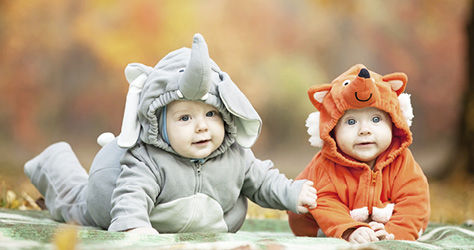Congratulations, you are now the proud owner of a toddler!
Here’s what developments to expect in the next six months.
At a glance
- How you can help them communicate
- Cup vs bottle debate
- Activities they might enjoy

Look at me now
Remember that tiny, adorable, but scrunched-up little baby you gave birth to a year ago? Since then they have grown an incredible 25cm and their weight will have doubled or tripled. Their brain has grown a lot too: it’s now reached 60 per cent of its adult size and has doubled in volume since birth. It’s not an exact science, though, as all babies are different. Health visitors say as long as they are roughly around the same ‘centile’ of the growth charts in their Red Book, there’s no cause for concern.
Step by step
If your little one has shown little enthusiasm for moving yet – and this is quite normal – you should begin to see some action in the next few months. The average age for first steps is around 13 months. If they can get about perfectly well shuffling on their bottoms or crawling they may be less interested in walking than other toddlers. You just have to let them set the pace – there’s not much you can do to hurry them. If your little one is happy cruising around holding on to the furniture, they might enjoy pushing a toddle truck or push-along toy which can encourage those feelings of upright independence and prepare them for letting go.
Not that book again
You may find yourself reading The Hungry Caterpillar or their favourite Peppa Pig book over and over again until you can do it with your eyes closed. You may yearn to dig a big hole in the garden and bury the book for a while, but bear with it. Toddlers – and babies – love repetition. Knowing what to expect on every page is their way of feeling secure, and they love that each time they see the story they may pick up a new detail. They’ll move on and embrace other books. One day.
Talk time
Your toddler may not have many words yet - the average is 10-20 by 18 months - but they’re still able to communicate. They understand a huge amount of what you say, even if they don’t always act on it! So it’s not such a good idea these days to complain to friends about them while they’re in the room. They are using lots of non-verbal methods to get your attention – pointing, pulling at your clothes, gesturing, smiling or crying and whining. Their language will really start to develop quickly in the next few months. You can help by chatting loads to them, using lots of eye contact and leaving gaps for them to respond to if they want, keeping sentences simple and reading books to them.
Cup v Bottle
Now they've turned one it’s a good time to ditch bottles: research shows they’re bad for teeth and can delay speech. At this point, they’re well able to drink from a cup and to understand that the liquid will come out if they tip it up, so it’s worth persevering even if they’re reluctant to make the change.
How you can help
-
They’re able to play a bit more by themselves now, but you are still their favourite play thing and any time you play together will help their development
-
They’ll love action rhymes like Row Row Row the Boat (which will encourage language too)
-
Play tunnels and tents or homemade obstacle courses with cushions and blankets provide hours of fun
-
Play games that link words to objects, such as, ‘Where’s [toddler’s name]’s nose?’ (they won’t understand pronouns like ‘your’ yet)
-
It’s a good time to buy some chunky crayons or chubby chalks. In the summer they can have a ridiculous amount of fun ‘painting’ a garden path or patio with water from a bucket.
Are they normal?
A small note on developmental milestones: it’s really true – all toddlers are different and although we can encourage them, they will do things at their own pace and in their own time. Read more about toddler development anxiety here and see our milestones guide. See more about their language and speech development here.
You can also see more about your toddler's development with our milestones chart.